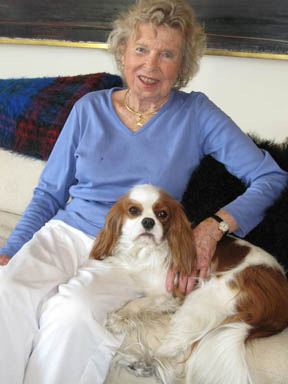Philanthropist Mercedes Eichholz Talks About Life and Politics
Portrait of a Lady

The Supreme Court justice whom Mercedes Eichholz married missed becoming president by an eyelash of fate, but she may have inspired his best opinions. “Merci,” as her friends call her, is best known in Santa Barbara for philanthropic work with nonprofits and as former chairman of the Museum of Art board; but, as a young woman, she was close to the vortex of power in Washington, D.C., for four decades and the wife of Justice William O. Douglas for 10 years. Before she married him, Douglas was President Franklin Roosevelt’s apparent choice as a running mate in 1944, she recalled during a recent lunch at Elements Restaurant.
Over dinner and drinks in the oppressive July heat, FDR and his political advisers tossed one name aside after another, according to one history of the era, No Ordinary Time by Doris Kearns Goodwin. FDR’s people vetoed the incumbent, Henry Wallace. They considered him “too intellectual, too liberal, too idealistic, too impractical,” Goodwin wrote.
Roosevelt favored Douglas, whom he’d named to the court in 1939. The president pushed Douglas enthusiastically, Goodwin wrote, but talk turned to little-known Missouri Senator Harry Truman, who got the nod. Truman became vice president after Roosevelt was reelected to a fourth term that year, then president when Roosevelt died in April 1945. “Nobody thought Truman was worth a damn and he turned out to be one of our best presidents,” Eichholz told me. Douglas, a mercurial, charismatic character, stayed on the court and he and Eichholz were married in 1954.
In a letter marking her recent 90th birthday, Charles Reich-formerly a law clerk for Justice Hugo Black and professor of constitutional law at Yale Law School, and also author of The Greening of America-wrote to Eichholz’s daughter: “In my opinion, she was the best thing that ever happened to Bill, and the whole country owes her a debt of gratitude because her years with Bill were also his best years of service on the court and the period of his greatest opinions.”
When the couple made a long, station-wagon trip through the rutted roads of the Middle East, Eichholz was the mechanic. There are pictures of the young blonde in a blue dress, under the car tinkering while Douglas snapped photos. The car broke down repeatedly. She showed me a National Geographic where her excellent photos of that 1957 trip were published.
Good with tools? Why not? As a young girl, she’d grown up on a Louisiana cotton plantation during the Depression. There’s still plenty of Louisiana in her voice and feistiness in her sharp opinions. She tells of her French great-grandfather who owned a shipping agency in New Orleans. During the Civil War, “The Yankees stole a barge load of cattle,” she said. “He went to get it back and they threw him in jail. But he escaped.”
The cotton fields of poverty-stricken Louisiana led to the nation’s capital via marriage. At 22, Eichholz married a young, Yale-trained lawyer, C. Girard Davidson, and they headed to D.C. “Washington was a very small place in the 1940s,” she recalled. “We all went to the same parties,” especially after she married Justice Douglas and hobnobbed with other justices and their wives. “I always thought he had a genius mind,” but he was a difficult person to live with. “He knew what was right and wrong. He was also a man who needed total adulation,” she said. (Eichholz feels Douglas served too long on the court, especially after he suffered a stroke. His last opinions, after their divorce, weren’t good, she feels, but she gives him high marks for his conservationist work.)
In a previous talk I had with Eichholz several years ago, she said she admired Lady Bird Johnson, the late wife of president Lyndon Johnson, and Eleanor Roosevelt. President Roosevelt was a paraplegic due to polio, as many people knew, but he hid it well, Eichholz recalled. Eleanor busied herself making speeches around the country and looking into problem spots. “Eleanor was free to travel and was a great ‘eyes and ears’ for him.” And Jackie Kennedy had to put up with JFK’s womanizing, of which Jackie was well aware, Eichholz told me.
Eichholz does not suffer fools gladly and is free with her penetrating views on events here and beyond. Her opinions come with a flash of her blue eyes, but her words come softly and with the grace of her Southern upbringing.
She vehemently opposes the Iraq War. She turned out for several demonstrations at De la Guerra Plaza in support of the reporters and editors. At the recent fundraiser for former editor Jerry Roberts, Eichholz caused a minor sensation with her blasts at the News-Press publishers. She keeps close track of national events. She is a collector of fine art and her coffee table is piled with art books.
Trim and lithe at 90, thanks in part to pilates classes, she lives in a lovely townhouse near downtown and enjoys a wide circle of Santa Barbara’s movers and shakers. She donates to numerous area nonprofits. Eichholz has two children from her first marriage. Her third husband, tax attorney and art collector Robert Eichholz, died in 1983. Never far from her side is her pet pooch, Gracie, named for Grace, wife of President Calvin Coolidge. Art may be her passion, but politics comes next.



